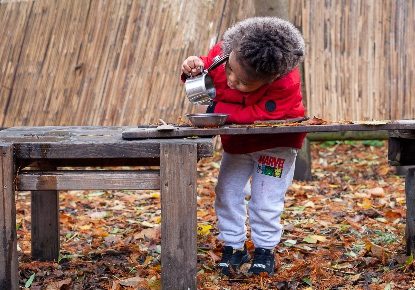Pavla Boulton and Dr Amanda Thomas (University of South Wales) connect with Froebel to extend their understandings of young children's schemas and outdoor play in early childhood education.
How can a Froebelian approach help us to think about children’s schematic development?
Schemas are often observed when young children are allowed to lead their own play, supporting their learning and development.
Froebel believed that play was part of being human. Play is a fundamental vehicle for learning and Froebel envisioned the power of play as a place where children created deep connections and awareness, and where children made sense of the world around them.
Schemas help us to organise and process our thoughts and feelings. They help us to think. As we get older our schemas do not go away, they get more and more sophisticated.
Schemas can be seen as repeated patterns of behaviour usually seen in young children’s play, supporting knowledge and understanding of how the world works.
Viewed through a Froebelian lens schematic development can be considered part of the rich provision which challenges children - supporting continuity of provision, helping children to reflect on activities and connect with previous experiences - guided with sensitive interactions from reflective educators.
Piaget (1953) believed that children organise their knowledge and understanding of the world into cognitive structures - or Schemas.
There are many different dynamic action schemas:
- Trajectory - up and down, along and back movements
- Enclosing / containing - putting things into containers, surrounding things with boundaries
- Transporting - moving objects and themselves from one place to another
- Transforming - changing things
- Positioning - putting items in particular places
- Rotational - things that go round
- Connecting and disconnecting - joining things together and taking things apart
- Enveloping - covering things and themselves up
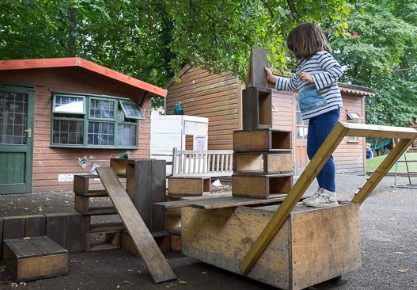
Children benefit in so many ways when educators place greater emphasis on the use of the outdoor environment as a resource for learning.
Connecting with nature
Froebel’s love of nature and the importance of affording children the opportunities to connect with living things in the outdoor environment - as well as the universal laws of nature such as gravity and motion, light and sound - are best served by play in the outdoors and wider natural environment.
Children benefit in so many ways when educators place greater emphasis on the use of the outdoor environment as a resource for learning.
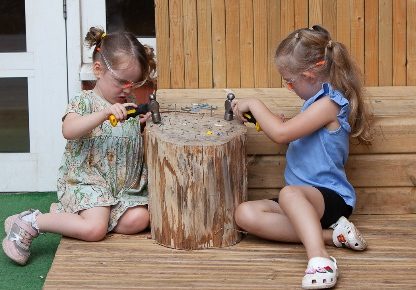
In the outdoors, children can move more freely, play on a larger scale and experience at first hand the world around them, enhancing so many elements of development from problem solving, to gross and fine motor skills, and social and emotional development.
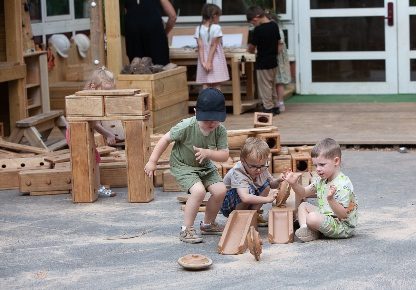
Froebel saw children’s development as holistic. Physical development cannot be isolated from cognitive development in the early years. Play enables children to think creatively; their actions and ideas are steered by their imaginations. When children’s play is allowed to ‘venture’ into wonder and creativity, children make unusual connections and these repeated patterns of thinking are what often manifest as schemas.
Observing children’s schemas provides the educator with a window into the child’s world, it is an insight into how they think and how they are processing what is going on around them. Therefore, observation is important, it is more than ‘watching’, but requires listening and being interested in the ways of the child – ‘tuning in’. As such it is important that adults are sensitive to children’s needs and interests.
Why is it important for educators to recognise and support schemas?
- They encourage educators to observe children closely.
- They provide an understanding of what otherwise may be seen as a series of disconnected and random actions by the child.
- They support educator planning and children’s development through exploration and investigation - pedagogy becomes child focused and child centred.
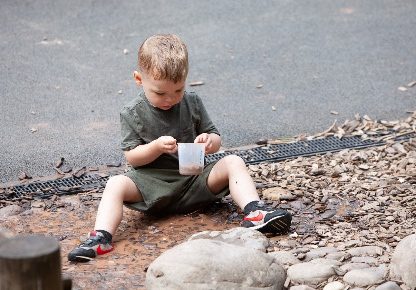
Children will ‘tinker’ with the objects available to them, taking them into places, spaces, and orientations outdoors that would be difficult to replicate indoors. Educators do not need to teach children how to play - but just need to step out of the way, enabling children’s imaginations to nurture their schemas.
Schemas are an essential element of children’s development. They are a key cognitive process through which they construct knowledge and actively make meaning of the world around them.
-
Further reading
- Observing young children, Froebel Trust pamphlet by Dr Stella Louis, January 2022. Free to download.
- The importance of schemas in every child’s learning - An article by Dr Stella Louis published by Community Playthings in November 2026. Free to access.
- Outdoor play and exploration, Froebel Trust pamphlet by Helen Tovey, August 2017. Free to download.
- Empowering learning: Play, symbols and creativity, Froebel Trust pamphlet by Professor Tina Bruce, September 2023. Free to download.
- Froebel's principles and practice today, Froebel Trust pamphlet by Helen Tovey, March 2020. Free to download.
- Understanding Schemas in Young Children: Again! Again! by Clare Beswick, Liz Magraw, Lisa Hayes and Stella Louis (Featherstone, 2013)
Interested in learning more about Froebelian principles?
Download a free posterReferences
Athey, C. (1990) Extending Thought in Young Children: A Parent-Teacher Partnership. London: Paul Chapman.
Beyer, K., Bizub, J., Szabo, A., Heller, B., Kistner, A., Shawgo, E., & Zetts, C. (2015). Development and validation of the attitudes toward outdoor play scales for children. Journal of Social Sciences and Medicine, 133, pp.253–260.
Bilton, H. (2002). Outdoor play in the early years: Management and innovation (2nd ed.). London: David Fulton.
Boulton, P. and Thomas, A. (2022a). How does play in the outdoors afford opportunities for schema development in young children? International Journal Of Play.
Boulton, P. and Thomas, A. (2022b). Toolkit: Schematic Development and the Curriculum for Funded Non-maintained Nursery settings. University of South Wales . Available at : Schematic Development Toolkit 2022 (gov.wales)
Boulton, P. and Thomas, A. (2021) Schemas and Loose Parts. Training package provided to Primary Schools in South East Wales; April – July 2021.
Carson, R. (1956). A sense of wonder. New York: Harper Collins publishers.
Gibson, J. J. (1979). The ecological approach to visual perception. Boston: Houghton Mifflin.
International School of Macaco (ISM). (2018, May 28). Outdoor play and child development.
Lilley, I. (1967) Friedrich Froebel: A Selection from his Writings. Cambridge : Cambridge University Press.
Louis, S. (2018) Schemas / Sgemâu. Cardiff: Early Years Wales
Moore, D. (2015). The teacher doesn’t know what it is, but she knows where we are: Young children’s secret places in early childhood outdoor environments. International Journal of Play, 4 (1), 20–31.
Nicholson, S. (1971). How not to cheat children - the theory of loose parts.
Ouvry, M. (2003). Exercising muscles and minds. London: National Children’s Bureau.
Piaget, J. (1953) The Origins of Intelligence in the Child. 2nd edn. London: Routledge and Kegan Paul.
Thomas, A. (2018) Thomas, A. (2018) Exploring the role of schemas within the Welsh Foundation Phase curriculum. [Unpublished doctoral dissertation]. University of South Wales.
Tovey, H. (2020). Froebel’s principles and practice today. Froebel Trust.
Tovey, H. (2017) Outdoor play and exploration. Froebel Trust.
Welsh Assembly Government (2009). Outdoor Learning Handbook. Cardiff: Crown Copyright.
About the article authors
Pavla Boulton and Dr Amanda Thomas Amanda are both senior lecturers in Early Years Education and Practice at the University of South Wales . Amanda is currently delivering on a range of modules on the Early years and ITE degrees. After successfully leading the Early Years provision in a primary school for over 10 years, Amanda taught in FE for four years training childcare practitioners. She was awarded her PhD in researching schemas in the Foundation Phase in 2018.
Pavla lectures on the Early Years Education & Practice Degree and the ITE programme. She is passionate about outdoor learning and play and as a Forest school leader revels in opportunities to take students and children outside to engage with the natural environment enhancing their connection with nature. Other research interests are ‘blended pedagogies’ and exploring the place for digital technology in outdoor learning and play. She was awarded a national teaching fellowship in 2020.
Amanda has published several books on learning and child development in the Early Years, and they have both delivered numerous CPD opportunities nationally and internationally as well as developed online resources to support practitioners in their Early Years Practice.
